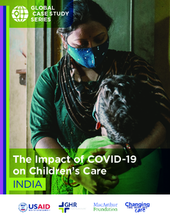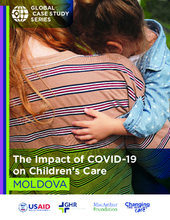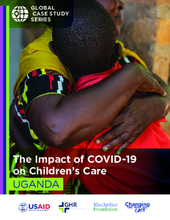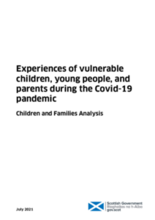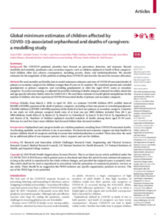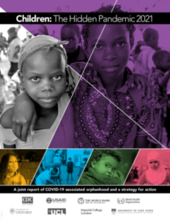This section includes resources and tools related to alternative care during the COVID-19 pandemic.
Displaying 1 - 10 of 185
This case study is part of a series of case studies conducted in India, Kenya, Moldova and Uganda over the course of 2020-2022 to share information on how COVID-19 has and is affecting family-child reunification, alternative care placement, and offers recommendations for family- and community-based care of vulnerable children in the context of COVID-19 and future emergencies.
This case study is part of a series of case studies conducted in India, Kenya, Moldova and Uganda over the course of 2020-2022 to share information on how COVID-19 has and is affecting family-child reunification, alternative care placement, and offers recommendations for family- and community-based care of vulnerable children in the context of COVID-19 and future emergencies.
This case study is part of a series of case studies conducted in India, Kenya, Moldova and Uganda over the course of 2020-2022 to share information on how COVID-19 has and is affecting family-child reunification, alternative care placement, and offers recommendations for family- and community-based care of vulnerable children in the context of COVID-19 and future emergencies.
यस अध्ययनले सातवटा केन्द्रित देशहरूमा २१ अर्ध-संरचित अन्तर्वार्ताहरू समावेश गरी गुणस्तरीय अनुसन्धान अध्ययन सञ्चालन गरेर निजी रूपमा सञ्चालित र वित्त पोषित आवासीय हेरचाह संस्थाहरूको सानो संख्यामा COVID-19 को प्रभावको अन्वेषण गर्दछ।
This webinar, the sixth in the Transforming Children's Care Webinar Series, provided an introduction to trauma-informed care from various perspectives and vantage points.
This webinar, the fifth in the Transforming Children's Care Webinar Series focused on a new study ('Impact of COVID-19 on Privately Run Residential Care Institutions: Insights and Implications for Advocacy and Awareness Raising'). The study, comprising 21 semi-structured interviews across seven focus countries, explores the effect of COVID-19 on a small number of privately run and funded residential care institutions.
This report presents findings from qualitative research conducted with a range of children, young people and parents in vulnerable or seldom heard groups, carried out to explore their lived experiences during and throughout the COVID-19 pandemic.
This study used mortality and fertility data to model minimum estimates and rates of COVID-19-associated deaths of primary or secondary caregivers for children younger than 18 years in 21 countries.
This report presents statistical data from 192 countries on children experiencing COVID-19-associated orphanhood and death of grandparent caregivers, a description of the trends in these data, a real-time COVID-19 Calculator for Death of Parents and Caregivers, and strategies and principles for integrating care for children bereaved by the virus into every nation’s COVID-19 response planning.
These presentations from UNICEF and Alternative Care Thailand were delivered during the July 9, 2021, workshop of the Care Measurement Task Force of the Transforming Children's Care Global Collaborative Platform. The focus of the workshop was on care measurement initiatives in Eastern and Southern Africa and Thailand.

